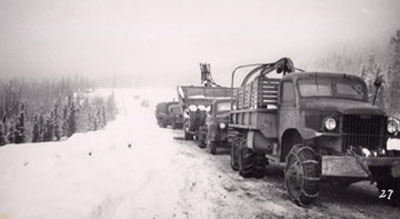Alaska Highway National Historic Event
Contact Creek, British Columbia

Army convoy
© Provincial Archives/P6826
Address :
Contact Creek, British Columbia
Recognition Statute:
Historic Sites and Monuments Act (R.S.C., 1985, c. H-4)
Designation Date:
1954-06-07
Other Name(s):
-
Alaska Highway
(Designation Name)
Importance:
Joint United States - Canadian Defence Project 1941-43, Dawson Creek to Fairbanks
Plaque(s)
Existing plaque: Contact Creek, British Columbia
To lessen the vulnerability of Alaska after the outbreak of war in the Pacific, in 1941, the United States and Canada built this highway as a joint defence project. Construction began in March 1942, and by the end of 1943 Dawson Creek, B.C., and Fairbanks, Alaska, were linked by 1523 miles of all-weather road. In 1946 the 1221 miles in Canada came under exclusive Canadian control. Although conceived and executed as a war measure, the highway has opened for development a large, hitherto inaccessible area of Canada's north.
Existing plaque: On a pedestal on an abandoned original stretch, near Sheep Mountain Soldiers Summit, Yukon Territory
The Alcan military Highway from Dawson Creek, British Columbia to Big Delta, Alaska, was opened here at Soldier's Summit on 20 November 1942. Relying on local Native guides and generally following existing trails, United States military and civilian personnel finished the road in under 10 months. Intended to support the airfields of the Northwest Staging Route, much of the road became part of the Alaska Highway. Its completion in 1943 opened the Northwest to southern exploitation of natural resources, altering Yukon settlement patterns and changing Native ways of life.